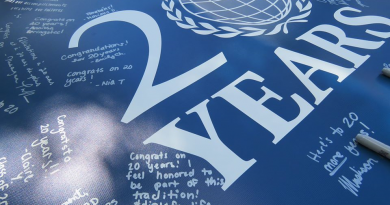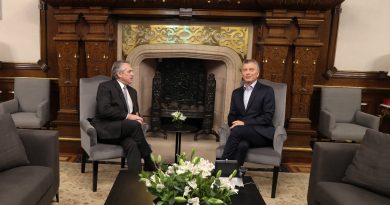Patriota: “Brazil is very committed to the status quo”
By Francesca Regalado
Managing Editor
Brazil’s Permanent Representative to the United Nations Antonio de Aguiar Patriota visited Seton Hall University on April 13. Ambassador Patriota delivered a lecture on “Brazil in a Changing Global Environment” to a roomful of professors and students. Before his lecture, the ambassador enjoyed lunch with the faculty and administration of the School of Diplomacy, where he also met a few Brazilian students.
Brazil’s ambitions to pursue United Nations reform and an expansion of the Security Council was a popular topic during the lecture and a prior interview with the Seton Hall press corps. Ambassador Patriota reiterated Brazil’s support for the U.N. Charter and international law, but added, “Brazil is looking to change the status quo only in governance mechanisms because we feel that while in certain areas such as financial and economic coordination, the G7 has been replaced by the G20 that is more representative and in tune with today’s multipolarity, at the UN, there have been other instances where the organization has evolved but the SC remains very much a reflection of what a majority of observers would consider an outdated distribution of geopolitical power. It still reflects through the [Permanent Five] the geopolitics of 1945.”
Frustration with the Security Council is felt not only by governments but also by civil society, the ambassador noted, particularly “with the inability of the SC to deliver on a number of fronts – Syria where more than 200,000 people have died, areas where tension could have been avoided such as Ukraine – in addition to long-standing unresolved questions such as Israel and Palestine.”
Security Council reform has been a top priority of Brazilian foreign policy since initiated by former President Luiz Inacio Lula da Silva. According to Ambassador Patriota, the policy has not changed, as the Workers’ Party has been in power since Lula’s first term in 2003. Ambassador Patriota warned, “If the Security Council goes on for much longer with its present composition and a handful of countries continue to try to prevent reform, the serious risk is that there will be an erosion of respect for multilateralism and we will fall into rival hegemonic agendas, which is what more or less happened before World War I.”
As “strong believers in diplomacy,” Ambassador Patriota describes Brazilians as “very suspicious and mistrusting of resorting to force to solve tensions because very often military force makes matters worse.” This characterizes Brazil’s policy of reaching out to states that have been treated as pariahs by the international community. The ambassador discussed Brazil and Turkey’s initiation of a dialogue with Iran regarding the latter’s nuclear program in 2010, saying that the effort “could have been a confidence-building measure but what ultimately became a missed opportunity.” The delay has allowed Iran to develop more centrifuges and to further enrich uranium.
Regarding another international pariah, Ambassador Patriota praised the reopening of relations between Cuba and the United States: “President Obama has decided to overturn an anachronistic attitude towards Cuba,” a policy that does not reflect today’s world. The ambassador pointed out that the U.S. has long had relations with Vietnam and other countries that have governments similar to Cuba’s.
At the recent Summit of the Americas where the historic meeting between President Obama and Cuban President Raul Castro took place, Mr. Obama also had a bilateral meeting with President Dilma Rousseff, during which a visit to Washington by the Brazilian President was scheduled for June 30.
Ambassador Patriota hinted that the United States was influenced by its isolation in the 2012 Summit: “Many countries had declared that they would not attend another summit unless Cuba was present.” He added, “Lifting the isolation of Cuba allows better coordination in regional affairs.”
Brazil’s position as an outspoken advocate for multilateralism is most evident in its contribution to U.N. peacekeeping operations. Ambassador Patriota mentioned Lieutenant General Carlos Alberto dos Santos Cruz of Brazil, who leads the United Nations Organization Stabilization Mission in the Democratic Republic of the Congo (MONUSCO). Brazil’s weighty contribution to peacekeeping operations – greater than that of Russia, a Permanent Member– supports the Latin American leader’s Security Council ambitions. To ignore the new distribution of geopolitical power would be, as Ambassador Patriota says, “taxation without representation.”


